Notes from the Editors

From mainstream news reports, one might easily conclude that the Paris climate agreement, presented to the world on December 12, 2015, was a complete triumph. The Guardian headlined it as “The World’s Greatest Diplomatic Success.” However, by any meaningful criteria, the Paris climate change agreement was fraudulent, based on a fabric of illusion. Moreover, the distorted media coverage of the climate deal, presenting it as a historical agreement virtually without shortcomings, was made possible in large part by the French government’s banning of the mass climate protests, following the November 2015 terrorist attacks in Paris. With radical protestors silenced and their demands marginalized, the global power elite could make virtually any public claims it wished, without acknowledging any other public voice or alternative view. | more…
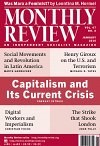
Prabhat Patnaik’s Review of the Month in this issue addresses problems of economic stagnation and imperialism in the context of explaining the current global crisis. Patnaik is part of a broad tradition of Marxian thought and heterodox economic analysis more generally that has long focused on issues of economic stagnation under monopoly capitalism. Such questions are now finally being taken up even by orthodox economists, but in ways that systematically ignore decades of contributions in this regard made by heterodox theorists. Ever since Larry Summers raised the issue of secular stagnation (referring back to Alvin Hansen’s theory of the 1930s and ’40s) at an IMF meeting in 2013, the question of stagnation has become part of a worldwide economic debate, moving issues that were once on the margins to center stage. This has resulted in a proliferation of mainstream economic treatments of the history of the secular stagnation concept in the 1930–1950s period, after which mainstream economists had essentially declared the issue dead. | more…

In this issue we feature two articles on the 1965–1966 mass killings and imprisonments in Indonesia. The army-led bloodbath was aimed at the near-total extermination of members of the Indonesian Communist Party (PKI), then a highly successful electoral party with a membership in the millions.… In all, an estimated 500,000 to a million (or more) people were murdered. Another 750,000 to a million-and-a-half people were imprisoned, many of whom were tortured. Untold thousands died in prison. Only around 800 people were given a trial—most brought before military tribunals that summarily condemned them to death.… The United States…was involved clandestinely in nearly every part of this mass extermination: compiling lists of individuals to be killed; dispatching military equipment specifically designated to aid the known perpetrators of the bloodletting; offering organizational and logistical help; sending covert operatives to aid in the “cleansing”; and providing political backing to the killers.… [T]he mass killings…[were carried out with the active] complicity of the U.S. media. | more…
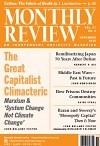
To understand why the Middle East is now in shambles, with the United States currently involved simultaneously in wars against both the Assad government in Syria and the Islamic State in Iraq, generating the greatest refugee crisis in Europe since the Second World War, it is necessary to go back almost a quarter-century to the 1991 Persian Gulf War. The Gulf War, unleashed by the United States in response to Iraq’s invasion of Kuwait, was made possible by the growing disorder in the USSR followed by its demise later that same year. The USSR’s disappearance from the world stage allowed the United States to shift to a naked imperialist stance—though justified in the manner of the colonial empires of old as “anti-terrorism” and “humanitarian intervention”—not only in the Middle East, but also along the entire great arc that had constituted the perimeter of the former Soviet Union. | more…

Fifty years ago this month, beginning in early October 1965 and extending for months afterwards, the United States helped engineer a violent end to the Communist Party of Indonesia (PKI). Between 500,000 and a million Indonesians were killed by conservative factions of the military led by General Suharto and by right-wing Muslim youth—all with the direct involvement of the CIA, the close cooperation of the U.S. Embassy and State Department, and the guidance of the Johnson administration’s National Security Council.… In forthcoming issues of Monthly Review we are planning to publish work on the Indonesian genocide, which, alongside the Vietnam War, constitutes a major turning point in the history of Southeast Asia in the period, and one of the most brutal acts of mass carnage inflicted by imperialism in the twentieth century. The dire implications of this carry down to the present day. | more…

In the U.S. case, imperialism has always been closely tied to a system of racial domination at home. As W.E.B. Du Bois wrote some sixty years ago in “Negroes and the Crisis of Capitalism in the United States” (Monthly Review, April 1953; reprinted in April 2003),
The United States, with its existing social structure, cannot abolish the color line despite its promises. It cannot stop injustice in the courts based on color and race. Above all, it cannot stop the exploitation of black workers by white capital, especially in the newest South. White North America beyond the urge of sound economics is persistently driving black folk toward socialism. It is the United States which is straining every effort to enslave Asia and Africa, and educated and well-to-do black Americans are coming to know this just as well as anybody. They may delay their reaction; they may hold ominous silence. But in the end, if this pressure keeps up, they will join the march to economic emancipation [the struggle against capitalism], because otherwise they cannot themselves be free.
Despite the gains of the civil rights era, the reemergence of what is now called the “New Jim Crow,” based on the mass incarceration and repeated police killings of unarmed black men, shows that the old systems of racial control have been “modernized” in the present, maintaining the color line, if in modified fashion: not only in relation to black Americans—though they have a special position emerging out of the whole legacy of slavery…—but also with respect to all other people of color as well. | more…

May’s Review of the Month, “Honor the Vietnamese, Not Those Who Killed Them” by MR Associate Editor Michael D. Yates, has elicited many responses. One writer said that Yates had written the best, but perhaps the first, Marxist analysis of the war. Another praised Monthly Review for having the courage to publish this article. Still a third predicted that in the more distant future, humanity would embrace the essay’s judgment and honor the Vietnamese people for their heroic struggle against the overwhelming might of the U.S. military.… In light of these comments, as well as the subject matter of this double issue of Monthly Review on imperialism, we thought it might be worthwhile to say something more about what the Vietnamese themselves naturally enough call the American War, with an eye toward drawing important lessons useful for contemporary radicals. | more…
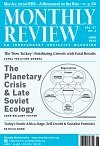
In two Monthly Review special issues, “Education Under Fire: The U.S. Corporate Attack on Students, Teachers, and Schools” (July-August 2011) and “Public School Teachers Fighting Back” (June 2013), we sounded an alarm regarding the rapid restructuring and privatization of U.S. K–12 public schools. In terms of the scale of nationwide restructuring, the corporate takeover of education is unprecedented in modern U.S. history. The closest comparison we can come up with is the destruction of the street car systems across the United States and the building of the interstate highway system—in which freeways went right through cities for the first time, often in the face of neighborhood and community resistance. With respect to K–12 education, unimaginable amounts of private funds have gone into pressuring and corrupting government at every level, while the control mechanisms of the new educational system are increasingly left in private, not public, hands. The Common Core Standards and related high-stakes tests are at the center of this new system, and are the product of private corporate groups outside the direct reach of government. | more…

As we write these notes in March 2015, the Pentagon’s official Vietnam War Commemoration, conducted in cooperation with the U.S. media, is highlighting the fiftieth anniversary of the beginning of the U.S. ground war in Vietnam, marked by the arrival of two Marine battalions in De Nang on March 8, 1965. This date, however, was far from constituting the beginning of the war. The first American to die of military causes in Vietnam, killed in 1945, was a member of the Office of Strategic Services (a precursor of the CIA). U.S. intelligence officers were there in support of the French war to recolonize Vietnam, following the end of the Japanese occupation in the Second World War and Vietnam’s declaration of national independence as the Democratic Republic of Vietnam. The French recolonization effort is sometimes called the First Indochina War in order to distinguish it from the Second Indochina War, initiated by the United States. In reality, it was all one war against the Viet Minh (Vietnamese Independence League). By the time that the Vietnamese defeated the French at Dien Bien Phu in 1954, the United States was paying for 80–90 percent of the cost of the war. | more…
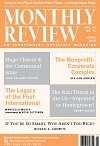
The Review of the Month in this issue (“Chávez and the Communal State” by John Bellamy Foster) focuses on the revolutionary political strategy introduced by Hugo Chávez and the Bolivarian movement in Venezuela. In the process it addresses how István Mészáros’s Beyond Capital played a key, strategic role in the development of Chávez’s thinking. Beyond Capital is a daunting philosophical work of around a thousand pages, while many of his other writings are nearly as challenging. MR readers will therefore be pleased to learn that we have just published a new book by Mészáros, The Necessity of Social Control (Monthly Review Press, 2015), expressly designed, as Foster writes in the book’s “Foreword,” as “an easily accessible work,” providing “a way into his thinking for the uninitiated” (9).… Yet, Mészáros’s new book is much more than that. | more…

From its earliest years, Monthly Review has been distinguished among socialist publications by the degree to which it has incorporated environmental views into its fundamental perspective. Paul Sweezy’s 1950 article, “An Economic Program for America”…listed conservation of natural resources and the elimination of destructive waste as two of the primary goals in the development of socialism. He called for the socialization, long-term planning, and conservation of “coal…oil and natural gas and all the other fuels which provide the lifeblood of modern industrial society.” Scott Nearing’s monthly column “World Events,” written for MR from the early 1950s to the early 1970s, regularly examined environmental, along with political-economic, developments. Nearing was a socialist economist and environmentalist.… With the publication of Rachel Carson’s Silent Spring in 1962, Nearing explored its wider ecological implications, contending that civilization had entered the “phase of suicidal destructivity…. Without doubt man has built a pyramid of potential destructivity…. Man is a destroyer as well as a builder. He has exterminated entire species…. He has destroyed forests and opened the soil to erosion. He has engaged in fratricidal wars that have wiped out one civilization after another and presently threaten to end western civilization” (Nearing, “World Events,” Monthly Review, November 1962). | more…

John Cassidy, who writes on economics for the New Yorker, is in our view one of the most interesting anhd creative commentators on economic analysis and trends writing in the mainstream today. His perspective might be best characterized as institutionalist-realist, in the tradition of thinkers like Thorstein Veblen, John Kenneth Galbraith, and Hyman Minsky.… Cassidy’s latest critical contribution is an online New Yorker news item published on December 12, 2014, carrying the rather prosaic title, “The Winner of the Spending Bill Vote: Jamie Dimon.”… [In this piece] Cassidy…explain[s] how the spending bill passed by the House of Representatives included a rider that rolled back regulations that had been imposed after the Great Financial Crisis on some of the riskier activities of banks. Such speculative activities were to be transferred to the unregulated bank subsidiaries not covered by the federally guaranteed bank insurance system. This has now been reversed and banks are again allowed to engage directly in such high-risk speculative activities, with the losses being picked up by the general public.… There is no doubt that Cassidy is correct, and that the analyses of “left-left” thinkers like Sweezy, one of Monthly Review’s founding editors, and Chomsky, an MR author, have been generally on the mark in pointing out that such outcomes are to be expected in the state management of the economy. | more…
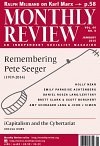
The publication of socialist books in the United States has always encountered serious institutional obstacles. This can be seen in the enormous hurdles that stood in the way of the successful publication 130 years ago of the English translation of Engels’s The Condition of the Working Class in England (1845)—today recognized as the classic account of the impact of the Industrial Revolution on workers. In 1885 Florence Kelley (-Wischnewetzky), the daughter of William D. Kelley, a U.S. Congressman and supporter of Lincoln, translated Engels’s book into English. Her initial plan was to publish the translation in the United States with the respected publishing firm of G.P. Putnam & Co. However, Putnam declined to publish it on the grounds that the book was outdated…and did not apply to U.S. industrialization, where such conditions of class exploitation were supposedly absent.… It is owing to these difficulties, associated with the U.S. publication of his book, that we have the benefit of some of Engels’s more important comments regarding the problem of publishing socialist works in a capitalist society. | more…












